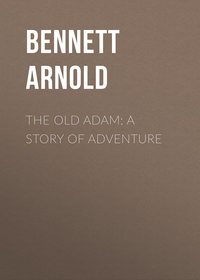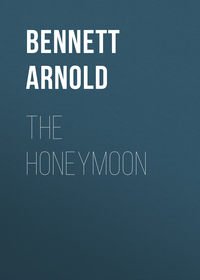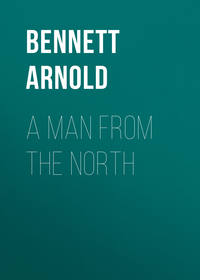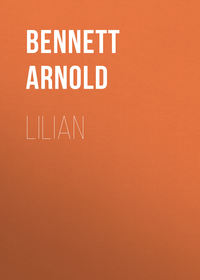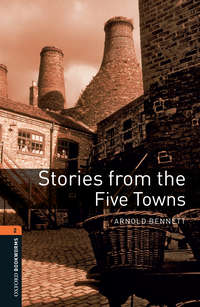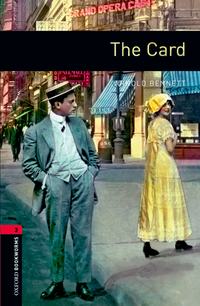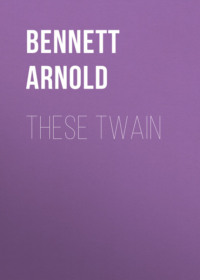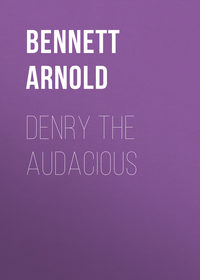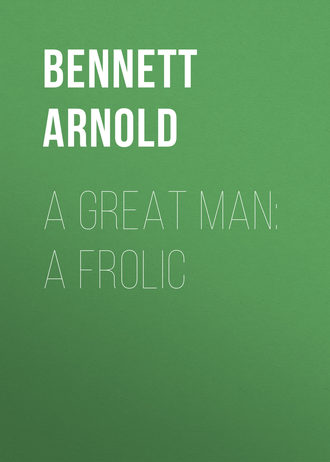 полная версия
полная версияA Great Man: A Frolic
'Of course you will, won't you, my dear?' Mrs. Knight demanded fondly of her son.
Henry nodded weakly.
The interesting and singular fact about the situation is that these three adults, upright, sincere, strictly moral, were all lying, and consciously lying. They knew that Henry's symptoms differed in no particular from those of his usual attacks, and that his usual attacks had a minimum duration of twelve hours. They knew that he was decidedly worse at half-past three than he had been at half-past two, and they could have prophesied with assurance that he would be still worse at half-past four than he was then. They knew that time would betray them. Yet they persisted in falsehood, because they were incapable of imagining the Speech Day ceremony without Henry in the midst. If any impartial friend had approached at that moment and told them that Henry would spend the evening in bed, and that they might just as well resign themselves first as last, they would have cried him down, and called him unfriendly and unfeeling, and, perhaps, in the secrecy of their hearts thrown rotten eggs at him.
It proved to be the worst dyspeptic visitation that Henry had ever had. It was not a mere 'attack' – it was a revolution, beginning with slight insurrections, but culminating in universal upheaval, the overthrowing of dynasties, the establishment of committees of public safety, and a reign of terror. As a series of phenomena it was immense, variegated, and splendid, and was remembered for months afterwards.
'Surely he'll be better now!' said Mrs. Knight, agonized.
But no! And so they carried Henry to bed.
At six the martyr uneasily dozed.
'He may sleep a couple of hours,' Aunt Annie whispered.
Not one of the three had honestly and openly withdrawn from the position that Henry would be able to go to the prize-giving. They seemed to have silently agreed to bury the futile mendacity of the earlier afternoon in everlasting forgetfulness.
'Poor little thing!' observed Mrs. Knight.
His sufferings had reduced him, in her vision, to about half his ordinary size.
At seven Mr. Knight put on his hat.
'Are you going out, father?' his wife asked, shocked.
'It is only fair,' said Mr. Knight, 'to warn the school people that Henry will not be able to be present to-night. They will have to alter their programme. Of course I shan't stay.'
In pitying the misfortune of the school, thus suddenly and at so critical a moment deprived of Henry's presence and help, Mrs. Knight felt less keenly the pang of her own misfortune and that of her son. Nevertheless, it was a night sufficiently tragic in Oxford Street.
Mr. Knight returned with Henry's two prizes — Self-Help and The Voyage of the 'Fox' in the Arctic Seas.
The boy had wakened once, but dozed again.
'Put them on the chair where he can see them in the morning,' Aunt Annie suggested.
'Yes,' said the father, brightening. 'And I'll wind up his watch for him… Bless us! what's he been doing to the watch? What is it, Annie?
'Why did you do it?' Mr. Knight asked Tom. 'That's what I can't understand. Why did you do it?'
They were alone together the next morning in the sitting-room. ('I will speak to that young man privately,' Mr. Knight had said to the two women in a formidable tone.) Henry was still in bed, but awake and reading Smiles with precocious gusto.
'Did the kid tell you all about it, then?'
'The kid,' said Mr. Knight, marking by a peculiar emphasis his dissatisfaction with Tom's choice of nouns, 'was very loyal. I had to drag the story out of him bit by bit. I repeat: why did you do it? Was this your idea of a joke? If so, I can only say – '
'You should have seen how he enjoyed them! It was tremendous,' Tom broke in. 'Tremendous! I've no doubt the afternoon was terrible, but the morning was worth it. Ask Henry himself. I wanted to give him a treat, and it seems I gave you all one.'
'And then the headmaster!' Mr. Knight complained. 'He was very upset. He told me he didn't know what they should do without Henry last night.'
'Oh yes. I know old Pingles. Pingles is a great wit. But seriously, uncle,' said Tom – he gazed at the carpet; 'seriously – ' He paused. 'If I had thought of the dreadful calamity to the school, I would only have bought half a pound.'
'Pah!' Mr. Knight whiffed out.
'It's a mercy we're all still alive,' murmured Tom.
'And may I ask, sir – ' Mr. Knight began afresh, in a new vein, sarcastic and bitter. 'Of course you're an independent member of society, and your own master; but may I venture to ask what you were doing in Hyde Park yesterday at eleven o'clock?'
'You may,' Tom replied. 'The truth is, Bollingtons Limited and me, just me, have had a row. I didn't like their style, nor their manners. So the day before yesterday I told them to go to the devil – '
'You told them to go to the – !'
'And I haven't seen anything of Bollingtons since, and I don't want to.'
'That is where you are going to yourself, sir,' thundered Mr. Knight. 'Mark my words. That is where you are going to yourself. Two guineas a week, at your age, and you tell them – ! I suppose you think you can get a place like that any day.'
'Look here, uncle. Listen. Mark my words. I have two to say to you, and two only. Good-morning.'
Tom hastened from the room, and went down into the shop by the shop-stairs. The cashier of the establishment was opening the safe.
'Mr. Perkins,' said Tom lightly, 'uncle wants change for a ten-pound note, in gold.'
'Certainly, Mr. Tom. With pleasure.'
'Oh!' Tom explained, as though the notion had just struck him, taking the sovereigns, 'the note! I'll bring it down in a jiffy.'
'That's all right, Mr. Tom,' said the cashier, smiling with suave confidence.
Tom ran up to his room, passing his uncle on the way. He snatched his hat and stick, and descended rapidly into the street by the house-stairs. He chose this effective and picturesque method of departing for ever from the hearth and home of Mr. Knight.
CHAPTER VII
CONTAGIOUS
'There's only the one slipper here,' said Aunt Annie, feeling in the embroidered slipper-bag which depended from a glittering brass nail in the recess to the right of the fireplace. And this fireplace was on the ground-floor, and not in Oxford Street.
'I was mending the other this morning,' said Mrs. Knight, springing up with all her excessive stoutness from the easy-chair. 'I left it in my work-basket, I do believe.'
'I'll get it,' said Aunt Annie.
'No, I'll get it,' said Mrs. Knight.
So it occurred that Aunt Annie laid the left slipper (sole upwards) in front of the brisk red fire, while Mrs. Knight laid the right one.
Then the servant entered the dining-room – a little simple fat thing of sixteen or so, proud of her cap and apron and her black afternoon dress. She was breathing quickly.
'Please'm, Dr. Dancer says he'll come at nine o'clock, or as soon after as makes no matter.'
In delivering the message the servant gave a shrewd, comprehending, sympathetic smile, as if to say: 'I am just as excited about your plot as you are.'
'Thank you, Sarah. That will do.' Aunt Annie dismissed her frigidly.
'Yes'm.'
Sarah's departing face fell to humility, and it said now: 'I'm sorry I presumed to be as excited about your plot as you are.'
The two sisters looked at each other interrogatively, disturbed, alarmed, shocked.
'Can she have been listening at doors?' Aunt Annie inquired in a whisper.
Wherever the sisters happened to be, they never discussed Sarah save in a whisper. If they had been in Alaska and Sarah in Timbuctoo, they would have mentioned her name in a whisper, lest she might overhear. And, by the way, Sarah's name was not Sarah, but Susan. It had been altered in deference to a general opinion that it was not nice for a servant to bear the same name as her mistress, and, further, that such an anomaly had a tendency to subvert the social order.
'I don't know,' said Mrs. Knight 'I put her straight about those lumps of sugar.'
'Did you tell her to see to the hot-water bottle?'
'Bless us, no!'
Aunt Annie rang the bell.
'Sarah, put a hot-water bottle in your master's bed. And be sure the stopper is quite tight.'
'Yes'm. Master's just coming down the street now, mum.'
Sarah spoke true. The master was in fact coming down the wintry gaslit street. And the street was Dawes Road, Fulham, in the day of its newness. The master stopped at the gate of a house of two storeys with a cellar-kitchen. He pushed open the creaking iron device and entered the garden, sixteen foot by four, which was the symbol of the park in which the house would have stood if it had been a mansion. In a stride he walked from one end to the other of the path, which would have been a tree-lined, winding carriage-drive had the garden been a park. As he fumbled for his latchkey, he could see the beaming face of the representative of the respectful lower classes in the cellar-kitchen. The door yielded before him as before its rightful lord, and he passed into his sacred domestic privacy with an air which plainly asserted: 'Here I am king, absolute, beneficent, worshipped.'
'Come to the fire, quick, Henry,' said Aunt Annie, fussing round him actively.
It would be idle to attempt to conceal, even for a moment, that this was not Henry the elder, but Henry Shakspere, aged twenty-three, with a face made grave, perhaps prematurely, by the double responsibilities of a householder and a man of affairs. Henry had lost some of his boyish plumpness, and he had that night a short, dry cough.
'I'm coming,' he replied curtly, taking off his blue Melton. 'Don't worry.'
And in a fraction of a second, not only Aunt Annie, but his mother in the dining-room and his helot in the cellar-kitchen, knew that the master was in a humour that needed humouring.
Henry the younger had been the master for six years, since the death of his father. The sudden decease of its head generally means financial calamity for a family like the Knights. But somehow the Knights were different from the average. In the first place Henry Knight was insured for a couple of thousand pounds. In the second place Aunt Annie had a little private income of thirty pounds a year. And in the third place there was Henry Shakspere. The youth had just left school; he left it without special distinction (the brilliant successes of the marred Speech Day were never repeated), but the state of his education may be inferred from the established fact that the headmaster had said that if he had stayed three months longer he would have gone into logarithms. Instead of going into logarithms, Henry went into shorthand. And shorthand, at that date, was a key to open all doors, a cure for every ill, and the finest thing in the world. Henry had a talent for shorthand; he took to it; he revelled in it; he dreamt it; he lived for it alone. He won a speed medal, the gold of which was as pure as the gold of the medal won by his wicked cousin Tom for mere painting. Henry's mother was at length justified before all men in her rosy predictions.
Among the most regular attendants at the Great Queen Street Wesleyan Chapel was Mr. George Powell, who himself alone constituted and comprised the eminent legal firm known throughout Lincoln's Inn Fields, New Court, the Temple, Broad Street, and Great George Street, as 'Powells.' It is not easy, whatever may be said to the contrary, to reconcile the exigencies of the modern solicitor's profession with the exigencies of active Wesleyan Methodism; but Mr. George Powell succeeded in the difficult attempt, and his fame was, perhaps, due mainly to this success. All Wesleyan solicitors in large practice achieve renown, whether they desire it or not; Wesleyans cannot help talking about them, as one talks about an apparent defiance of natural laws. Most of them are forced into Parliament, and compelled against their wills to accept the honour of knighthood. Mr. George Powell, however, had so far escaped both Parliament and the prefix – a fact which served only to increase his fame. In fine, Mr. George Powell, within the frontiers of Wesleyan Methodism, was a lion of immense magnitude, and even beyond the frontiers, in the vast unregenerate earth, he was no mean figure. Now, when Mr. Powell heard of the death of Henry Knight, whom he said he had always respected as an upright tradesman and a sincere Christian, and of the shorthand speed medal of Henry Shakspere Knight, he benevolently offered the young Henry a situation in his office at twenty-five shillings a week, rising to thirty.
Young Henry's fortune was made. He was in Powells, and under the protecting ægis of the principal. He shared in the lustre of Powells. When people mentioned him, they also mentioned Powells, as if that settled the matter – whatever the matter was. Mr. Powell invested Mrs. Knight's two thousand pounds on mortgage or freehold security at five per cent., and upon this interest, with Henry's salary and Aunt Annie's income, the three lived in comfort at Dawes Road. Nay, they saved, and Henry travelled second-class between Walham Green and the Temple. The youth was serious, industrious, and trustworthy, and in shorthand incomparable. No one acquainted with the facts was surprised when, after three years, Mr. Powell raised him to the position of his confidential clerk, and his salary to fifty-two shillings and sixpence.
And then Mr. Powell, who had fought for so long against meaningless honours, capitulated and accepted a knighthood. The effect upon Dawes Road was curious and yet very natural. It was almost as though Henry himself had accepted a knighthood. Both Mrs. Knight and Aunt Annie seemed to assume that Henry had at least contributed to the knighthood and that the knighthood was in some subtle way the reward of Henry's talent, rectitude, and strenuousness. 'Sir George' – those two syllables which slipped smoothly off the tongue with no effort to the speaker – entered largely into all conversations in the house at Dawes Road; and the whole street, beginning with the milkman, knew that Henry was Sir George's – no, not Sir George's confidential clerk, no such thing! – private secretary.
His salary was three guineas a week. He had a banking account at Smith, Payne and Smiths, and a pew at the Munster Park Wesleyan Chapel. He was a power at the Regent Street Polytechnic. He bought books, including encyclopædias and dictionaries. He wrote essays which were read and debated upon at the sessions of the Debating Society. (One of the essays was entitled: 'The Tendencies of Modern Fiction'; he was honestly irate against the Stream of Trashy Novels Constantly Poured Forth by the Press.) He took out a life insurance policy for two hundred and fifty pounds, and an accident policy which provided enormous sums for all sorts of queer emergencies. Indeed, Henry was armed at every point. He could surely snap his fingers at Chance.
If any young man in London had the right to be bumptious and didactic, Henry had. And yet he remained simple, unaffected, and fundamentally kind. But he was very serious. His mother and aunt strained every nerve, in their idolatrous treatment of him, to turn him into a conceited and unbearable jackanapes – and their failure to do so was complete. They only made him more serious. His temper was, and always had been, what is called even.
And yet, on this particular evening when Sarah had been instructed to put a hot-water bottle in his bed, Henry's tone, in greeting his aunt, had been curt, fretful, peevish, nearly cantankerous. 'Don't worry me!' he had irascibly protested, well knowing that his good aunt was guiltless of the slightest intention to worry him. Here was a problem, an apparent contradiction, in Henry's personality.
His aunt, in the passage, and his mother, who had overheard in the dining-room, instantly and correctly solved the problem by saying to themselves that Henry's tone was a Symptom. They had both been collecting symptoms for four days. His mother had first discovered that he had a cold; Aunt Annie went further and found that it was a feverish cold. Aunt Annie saw that his eyes were running; his mother wormed out of him that his throat tickled and his mouth was sore. When Aunt Annie asked him if his eyes ached as well as ran, he could not deny it. On the third day, at breakfast, he shivered, and the two ladies perceived simultaneously the existence of a peculiar rash behind Henry's ears. On the morning of the fourth day Aunt Annie, up early, scored one over her sister by noticing the same rash at the roots of his still curly hair. It was the second rash, together with Henry's emphatic and positive statement that he was perfectly well, which had finally urged his relatives to a desperate step – a step involving intrigue and prevarication. And to justify this step had come the crowning symptom of peevishness – peevishness in Henry! It wanted only that!
'I've asked Dr. Dancer to call in to-night,' said Aunt Annie casually, while Henry was assuming his toasted crimson carpet slippers. Mrs. Knight was brewing tea in the kitchen.
'What for?' Henry demanded quickly, and as if defensively. Then he added: 'Is mother wrong again?'
Mrs. Knight had a recurrent 'complaint.'
'Well,' said Aunt Annie darkly, 'I thought it would be as well to be on the safe side…'
'Certainly,' said Henry.
This was Aunt Annie's neat contribution to the necessary prevarication.
They had tea and ham-and-eggs, the latter specially chosen because it was a dish that Henry doted upon. However, he ate but little.
'You're overtired, dear,' his mother ventured.
'Overtired or not, mater,' said Henry with a touch of irony, 'I must do some work to-night. Sir George has asked me to – '
'My dear love,' Mrs. Knight cried out, moved, 'you've no right – '
But Aunt Annie quelled the impulsive creature with a glance full of meaning. 'Sir George what?' she asked, politely interested.
'The governor has asked me to look through his Christmas appeal for the Clerks' Society, and to suggest any alterations that occur to me.'
It became apparent to the ladies, for the thousand and first time, that Sir George would be helpless without Henry, utterly helpless.
After tea the table was cleared, and Henry opened his bag and rustled papers, and the ladies knitted and sewed with extraordinary precautions to maintain the silence which was the necessary environment of Henry's labours. And in the calm and sane domestic interior, under the mild ray of the evening lamp, the sole sounds were Henry's dry, hacking cough and the cornet-like blasts of his nose into his cambric handkerchief.
'I think I'll do no more to-night,' he said at length, yawning.
'That's right, dear,' his mother ejaculated.
Then the doctor entered, and, for all the world as if by preconcerted action, the ladies disappeared. Dr. Dancer was on friendly terms with the household, and, his age being thirty, he was neither too old nor too young to address Henry as Old Man.
'Hallo, old man,' he began, after staring hard at Henry. 'What's the matter with your forehead?'
'Forehead?' Henry repeated questioningly.
'Yes. Let's have a look.'
The examination was thorough, and it ended with the thrusting of a thermometer into Henry's unwilling mouth.
'One hundred and two,' said the doctor, and, smiling faintly, he whispered something to Henry.
'You're joking,' Henry replied, aghast.
'No, I'm not. Of course it's not serious. But it means bed for a fortnight or so, and you must go immediately.'
The ladies, who had obviously and shamelessly been doing that which they so strongly deprecated in Sarah, came back into the room.
In half an hour Henry was in bed, and a kettle containing eucalyptus was steaming over a bright fire in the bedroom; and his mother was bent upon black-currant tea in the kitchen; and Aunt Annie was taking down from dictation, in her angular Italian hand, a letter which began: 'Dear Sir George, – I much regret to say'; and little Sarah was standing hooded and girt up, ready to fly upon errands of the highest importance at a second's notice.
'Sarah,' said Mrs. Knight solemnly, when Sarah had returned from the post and the doctor's, 'I am going to trust you. Your master has got the measles, but, of course, we don't want anyone to know, so you mustn't breathe a word.'
'No'm,' said Sarah.
'He never had them as a boy,' Mrs. Knight added proudly.
'Didn't he, mum?' said Sarah.
The doctor, whose gift for seriousness was not marked, showed a tendency to see humour in the situation of Sir George's private secretary being down with measles. But he was soon compelled to perceive his mistake. By a united and tremendous effort Mrs. Knight and Aunt Annie made measles august. As for Sarah, she let slip the truth to the milkman. It came out by itself, as the spout of a teapot had once come off by itself in her hand.
The accident policy appeared to provide for every emergency except measles.
CHAPTER VIII
CREATIVE
The sick-room – all due solemnity and importance must be imported into the significance of that word – the sick-room became a shrine, served by two ageing priestesses and a naïve acolyte. Everything was done to make Henry an invalid in the grand manner. His bed of agony became the pivot on which the household life flutteringly and soothingly revolved. No detail of delicate attention which the most ingenious assiduity could devise was omitted from the course of treatment. And if the chamber had been at the front instead of at the back, the Fulham Vestry would certainly have received an application for permission to lay down straw in the street.
The sole flaw in the melancholy beauty of the episode was that Henry was never once within ten miles of being seriously ill. He was incapable of being seriously ill. He happened to be one of those individuals who, when they 'take' a disease, seem to touch it only with the tips of their fingers: such was his constitution. He had the measles, admittedly. His temperature rose one night to a hundred and three, and for a few brief moments his mother and Aunt Annie enjoyed visions of fighting the grim spectre of Death. The tiny round pink spots covered his face and then ran together into a general vermilion. He coughed exquisitely. His beard grew. He supported life on black-currant tea and an atmosphere impregnated with eucalyptus. He underwent the examination of the doctor every day at eleven. But he was not personally and genuinely ill. He did not feel ill, and he said so. His most disquieting symptom was boredom. This energetic organism chafed under the bed-clothes and the black-currant tea and the hushed eucalyptic calm of the chamber. He fervently desired to be up and active and stressful. His mother and aunt cogitated in vain to hit on some method of allaying the itch for work. And then one day – it was the day before Christmas – his mother chanced to say:
'You might try to write out that story you told us about – when you are a little stronger. It would be something for you to do.'
Henry shook his head sheepishly.
'Oh no!' he said; 'I was only joking.'
'I'm sure you could write it quite nicely,' his mother insisted.
And Henry shook his head again, and coughed. 'No,' he said. 'I hope I shall have something better to do than write stories.'
'But just to pass the time!' pleaded Aunt Annie.
The fact was that, several weeks before, while his thoughts had been engaged in analyzing the detrimental qualities of the Stream of Trashy Novels Constantly Poured Forth by the Press, Henry had himself been visited by a notion for a story. He had scornfully ejected it as an inopportune intruder; but it had returned, and at length, to get rid for ever of this troublesome guest, he had instinctively related the outline of the tale over the tea-table. And the outline had been pronounced wonderful. 'It might be called Love in Babylon– Babylon being London, you know,' he had said. And Aunt Annie had exclaimed: 'What a pretty title!' Whereupon Henry had remarked contemptuously and dismissingly: 'Oh, it was just an idea I had, that's all!' And the secret thought of both ladies had been, 'That busy brain is never still.'
As the shades of Christmas Eve began to fall, Aunt Annie was seated by the sick-bed, engaged in making entries in the household washing-book with a lead pencil. Henry lay with his eyes closed. Mrs. Knight was out shopping. Presently there was a gentle ting of the front-door bell; then a protracted silence; then another gentle ting.


